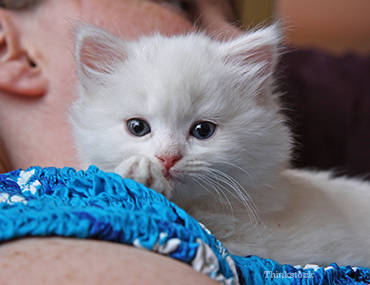
Dr. Phil Zeltzman is a traveling, board-certified surgeon in Allentown, PA. His website is www.DrPhilZeltzman.com. He is the co-author of “Walk a Hound, Lose a Pound” (www.WalkaHound.com).
Kelly Serfas, a Certified Veterinary Technician in Bethlehem, PA, contributed to this article.
Ms. Roxbury had just rescued a 6 month old kitten from her neighbor. She named her Firefly. She was absolutely in love with Firefly, especially because she had to say goodbye to her 15-year-old cat a few months prior.
Firefly was a sweet, active, young kitten. A few weeks after Ms. Roxbury brought Firefly home, she began to notice some vomiting and diarrhea. Ms. Roxbury was not very concerned. “It’s just a hairball,” she thought. The diarrhea also did not worry her much because she had recently switched Firefly's food. However, after two days, she realized that Firefly was not eating and did not seem to be her playful self.
Ms. Roxbury knew something was wrong and scheduled an appointment with her family veterinarian that day. The veterinarian did a complete physical examination and felt a thickening of the intestine. In a curious kitten, it was logical to believe that it could be compatible with a foreign body—such as a toy.
Blood work revealed anemia (a low red blood cell count) and a low protein level.
The vet reviewed belly X-rays with Ms. Roxbury. They were suggestive of a blockage in the small intestine. The next logical step was to get an ultrasound of the belly to confirm the suspicion of a foreign body.
 To everybody’s surprise, there was no foreign object. The ultrasound revealed that Firefly had an intussusception.
To everybody’s surprise, there was no foreign object. The ultrasound revealed that Firefly had an intussusception.
“Intu-what?" An intussusception is a rare but potentially deadly condition where one piece of intestine slides or telescopes inside another—like a sock. The treatment involves emergency surgery, hopefully, before that portion of intestine dies and causes leakage into the belly.
What causes intussusception?
Intussusception is caused by excessive motion in the intestine (i.e., peristalsis) which is overstimulated by a foreign body (such as a string), intestinal parasites, a tumor, irritation of the intestine or a viral infection. In some cases, we never find the cause. The breeds most often affected are the German shepherd and the Siamese cat.
How do you treat intussusception?
The veterinarian discussed surgery with Ms. Roxbury, who elected to proceed with it. Open abdominal surgery confirmed the diagnosis of intussusception. A five inch long section of intestine had slid inside another. The intestine looked purple, instead of a healthy pink meaning that there was a lack of blood supply for an extensive period of time.
The damaged section of intestine had to be removed, and the healthy part carefully sewn together. All other organs looked good.
Recovering from intussusceptions
Firefly recovered in the ICU. The next day, she had some diarrhea—the flood gates had opened. She was still uninterested in food, so she was kept on IV fluids and was fed a nutritional supplement. Two days after surgery, she was more comfortable and started to eat on her own. She was therefore sent home.
Ms. Roxbury had to follow all of the standard post operative instructions including confinement, monitoring the incision, keeping a plastic cone (i.e., E-collar) on and giving pain medication and antibiotics.
After one week, the biopsy report and a fecal exam showed that the cause of the intussusception was intestinal parasites. In fact, stray cats and dogs commonly have intestinal parasites. Firefly was started on a strict deworming program.
After two weeks, our kitten went back for suture removal and a progress exam. Her eating was back to normal and there was no vomiting or diarrhea. She could go back to her happy, playful life—much to her owner’s delight.
If you have any questions or concerns, you should always visit or call your veterinarian -- they are your best resource to ensure the health and well-being of your pets.

